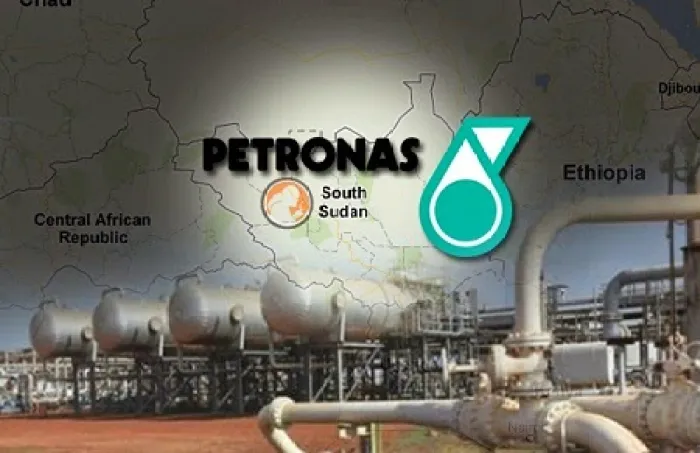A Prominent Juba-based advocate who is also the managing partner of M/S Pan African Law Chambers LLP has urged the Government of South Sudan to file counterclaims against Petronas for what he termed environmental genocide in the areas where the company explored and extracted crude oil.
Last week, Petronas International Corporation, a unit of Malaysian oil and gas conglomerate Petronas, launched arbitration proceedings against the Government of South Sudan after state-owned Nilepet assumed control of Petronas’ assets worth approximately $1.25 Billion.
This move government’s move effectively repossessed the Malaysian firm’s investment in the country. Earlier in August, Petronas announced plans to exit South Sudan following approximately three decades of operations in the region. The company had entered into negotiations with Savannah Energy, a UK-based oil and gas company, for the sale of its assets but the deal collapsed, with Petronas blaming South Sudanese officials for allegedly obstructing the deal.
M/S Pan African Law Chambers LLP’s Wani Santino Jada now contends that Petronas’ oil exploration has caused environmental genocide that has killed aquatic, wild, and domestic animals and has affected human beings. He says research done by Sign of Hope, an international German Jewish NGO, indicated that the oil pollution in Upper Nile has affected underground water up to the Bhar El Ghazel Region with some of the effects expected to remain for over 10 decades.
“South Sudan has commenced auditing that involves not only the environment but the long-term effects on the local pollutions for the next 100 years that needs to be paid by Petronas. If auditing is done well, the Government of South Sudan can fetch between USD 20 and 30 billion in counterclaims from Petronas for damages at the International Centre for Settlement of Investment Dispute (ICSID) as a result of the environmental pollution if the case is handled well by professional attorneys,” he explains. “In environmental law, the Polluter Pays Principle (PPP) concept asserts that those who produce pollution should bear the costs associated with managing it to prevent damage to human health and the environment. This principle is grounded in the belief that externalizing the costs of pollution onto society is unjust, and therefore, parties responsible for environmental harm should face financial accountability for their actions.”
According to advocate Wani, historically, the PPP has been recognized as a guiding norm in various international agreements and national laws. It was first articulated in the 1972 OECD Recommendation on Guiding Principles concerning International Economic Aspects of Environmental Policies, which established that the costs of pollution prevention and control measures should be borne by those who cause pollution. The principle gained further prominence with its inclusion in Principle 16 of the 1992 Rio Declaration on Environment and Development, which emphasized that national authorities should promote the internalization of environmental costs.

“In practice, this principle manifests through various regulatory mechanisms such as taxes, fines, or liability laws aimed at ensuring that polluters are held accountable for their environmental impact. For example, industries may be required to pay for cleanup efforts or invest in technologies to reduce emissions,” he clarified. “In the Republic of South Sudan, the domestic law especially the Transitional Constitution 2011, as amended, atoned environmental safety and biodiversity including liability for damages.”
The Petroleum Act, 2012 allows Liability for Pollution Damage according to section 61(1)(2)(3) of the Act, that states;
- The licensee or the contractor is liable for pollution damage without regard to fault.
- Contractors under the petroleum agreement are jointly and severally liable for pollution damage. This principle applies correspondingly to licensees where there are several holders of a license.
- The licensee or contractor shall create a pollution damage fund for clean-up and rehabilitation of the site in which the pollution damage is found.
Wani argues that the oil exploration by Petronas in the Republic of South Sudan was not in conformity with the constitution, neither was it in line with the Petroleum Act concerning environmental safeguards, hence it offended the laws of the country, warranting them to pay damages for the pollution caused during the exploration in the country.
The lawyer asserts that the application of the PPP varies across jurisdictions and that in the European Union, it is enshrined in law and guides environmental policy across member states. It mandates that polluters are responsible for preventing and remedying environmental damage.
In the United States, the principle underlies major U.S. environmental legislation such as the Clean Air Act and Clean Water Act, which impose obligations on polluters to manage their emissions responsibly.
In Australia and Canada, they have incorporated the PPP into their legal frameworks, requiring companies to take responsibility for any environmental harm they cause.
From an economic perspective, the polluter pays principle aims to correct market failures associated with negative externalities—costs incurred by third parties due to pollution. Internalizing these costs through mechanisms like carbon pricing or eco-taxes encourages businesses to adopt cleaner practices and technologies while fostering a culture of environmental responsibility.
“The Polluter Pays Principle serves as a crucial mechanism within environmental law aimed at promoting accountability among polluters while encouraging sustainable practices across various sectors,” the lawyer concluded.




